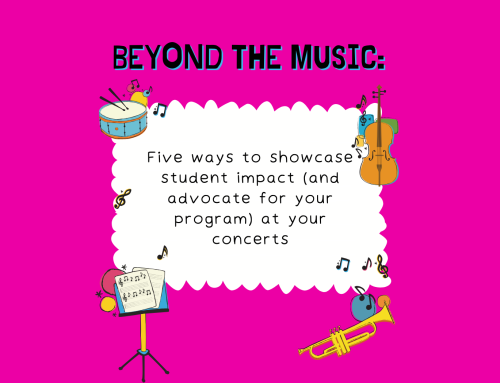This post is a response to the post “The Essential Work of the Arts”.
Taking Action
If you can agree that arts, in general, are important, then we can move to action items: what do we do as teachers of the arts? How do we harness our anger and frustration with this situation into productive action? With so much taken from us, let’s ask: What are the next steps?
I have a friend that once simply in passing told me that, “Life is mentality.” He said it to a group of us, in a small and nondescript way, but wow. What a concept. Really think about it…all of these frustrations with how our discipline is perceived or invested into are absolutely valid, but for what? Acknowledging these flaws is a step, but a singular one on how to course-correct some of this. Unfortunately, the answer for each person is different, so all I can offer is my perspective, or perhaps, my mentality in it all.
For me all of the concerns we are facing, in part amplified in the COVID-teaching age we find ourselves in, stem from the fact that I think we may be asking ourselves valid questions, but the wrong questions for where we currently are. As the practice of teaching has adapted to the current challenges, we have been asking two major questions of our teachers and, if you are a teacher, of ourselves. We are determined to crack the code on the best approach to HOW and WHAT we are teaching. The how is much more about teaching to the current situation we find ourselves in (depending on your location and district decisions you are looking at any level of remote, hybrid, or reduced teaching practices). How you are accomplishing this is an obviously valid question, and one that you need to address to be prepared day in and out.
However, this is also a question that once you find the answer based on the circumstances you find yourself in, it will not be changing again until major shifts above your paygrade occur. The what is a question that is more or less answered for us through curriculum. The caveat to it in our current circumstance is pacing, and that finds itself determined by your circumstances of teaching.
How & What vs. Who & Why
Let me be clear, the ‘how’ and ‘what’ are valid questions in every way, but we also are finding ourselves asking them over and over as if we expect different results. It causes a strain on our own mental well being as we teach, not to mention our students who are more perceptive to our emotions than we may sometimes believe. As a result of these conditions, I want to offer a suggestion: Stop. Stop asking these questions. Again, they are valid but they have been answered to the best of our ability, for the time being, so stop. Instead, spend more time asking WHY and WHO you are teaching.
Oftentimes, these are questions that we feel comfortable answering when we are asked in an interview or a student asks you why you became a teacher, but when is the last time you have had to put your money where your mouth is and proven your why? Look at our current situation for reflection. We find ourselves asking, “how am I supposed to teach half the class online while half is in person,” or “how do I manage three times as much planning because my classes are all in different spots?” These questions have been asked constantly in the last months and the reason we keep asking is that the answer is not one we like. Here is the answer to your how: you do it the best you can. We all know it is not the same as it was, but asking and sticking in these questions will not make a new answer appear.
Look at the next question though! The why you teach, presumably, has to do with educating, inspiring, and being there for our next generation of leaders and workers. While we have spent so much time asking ‘how’ we are going to do this, the ‘why’ we do it has been constant and the same– day in and day out… right under our noses. And every day we spend not making our students and their experiences in our classroom the priority of our questioning is another day we are not doing our best for them. We’re not doing the best for our ‘who’.
I can only speak to my own experiences, but I know two exact moments I wanted to become a music teacher. I remember where I was sitting, the lights, the mood… all of it. In the first, I watched a teacher whom I respected immensely speak so passionately as to why he chose his career path, and it aligned with everything his band course had provided for me so clearly. It was crystal clear to me that if this was the impact one person teaching could have on me, I wanted to try my best to pass that feeling on to students in my own right.
The second was the first time I remember having a truly emotional reaction to a piece of music. It was that moment on stage where everything clicked for every member of the ensemble. It was transformative. It was why I chose to do what I do.
From a reflective standpoint, neither of these experiences have to do with what or how I was being taught. They had to do with my engagement with my peers and my teachers. That commonality has not changed in our current predicament. If anything, the expectations of traditional performances are gone, so stop trying to fit in those boxes! Try new things! Try meaningful things for your students! Students very well might look at you like you are crazy because at this point in their education, how often are they being looked at and asked, “what would mean the most to you right now?”
Doing the Job for the Kids
I know this concept is an uncomfortable one for curriculum-driven and control-oriented folks, but it isn’t about you or what you want. It is about what your students need. We are in a time where socially and emotionally, anxieties and mental health issues are at an all-time high, especially for our students. On top of that, they are actively experiencing the stress of their parents and teachers who are struggling to maintain what/how their education was. Professionally, we are watching programs be cut and eliminated because they are being deemed as not-as-essential as other subject areas. I know I am preaching to the choir here, but I fundamentally disagree with that belief. Arguably, we have never been needed more by our students.
When we spend our days fighting fruitlessly to solve how I am supposed to teach band with no trumpets or percussion, or what I am teaching them towards if there are no concerts, we will lose that fight. Every time. But if I just stop and start to ask why am I teaching these students music and throw the book out the window and teach the children not the material, I just might find an answer to a question worth answering. Use your frustration and anger as fuel. Acknowledge and educate about the importance of the arts but stop preaching that we should be valued for what we give and start showing why we are essential. For everyone, but especially for our children.




Leave A Comment